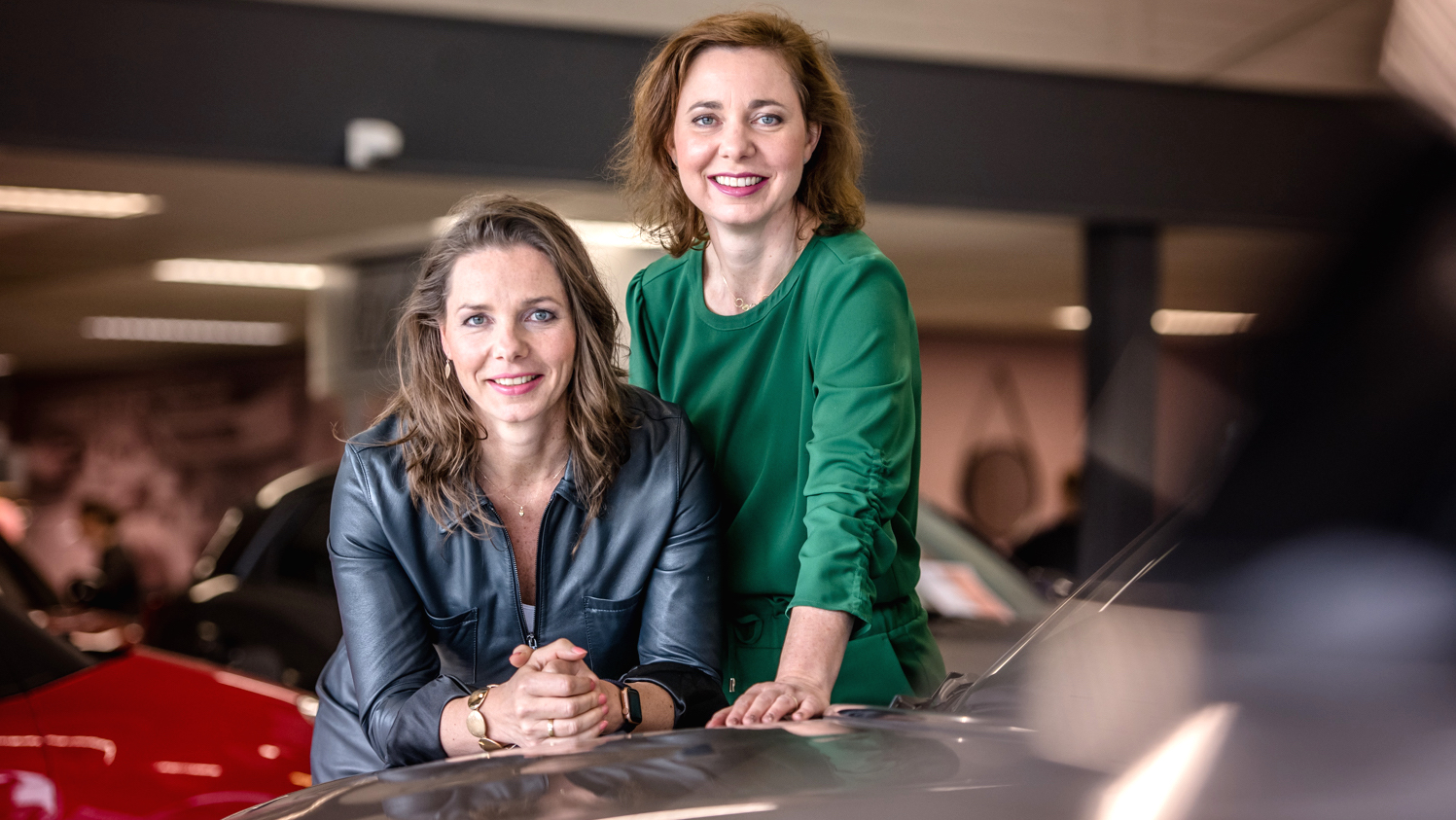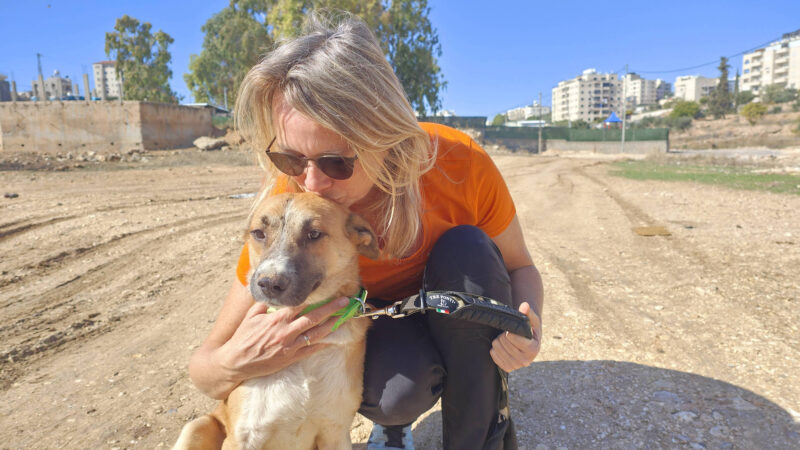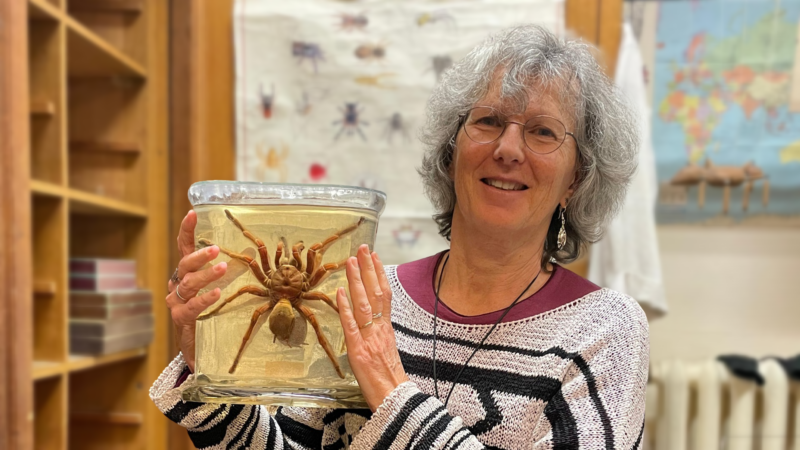The car industry is still heavily male-dominated. Two sisters in the Netherlands thus founded the first car dealership in the country with a workshop by women for women. And they are not alone: There are other trailblazers who want to see more women in technical jobs.
By Sarah Tekath, Amsterdam
A woman lies under a car. Only her legs are sticking out. In the car park of a shopping centre in ‘s-Hertogenbosch, shoppers turn their necks as they pass, stop or take photos. Does the woman need help? Has there been an accident? There is no blood on the light blue skinny jeans and coral-coloured pumps. Looking closer, something catches the eye. There is a pink toolbox on the floor next to the woman: She is fixing her car.
Even if the legs only belong to a mannequin – the message is real.
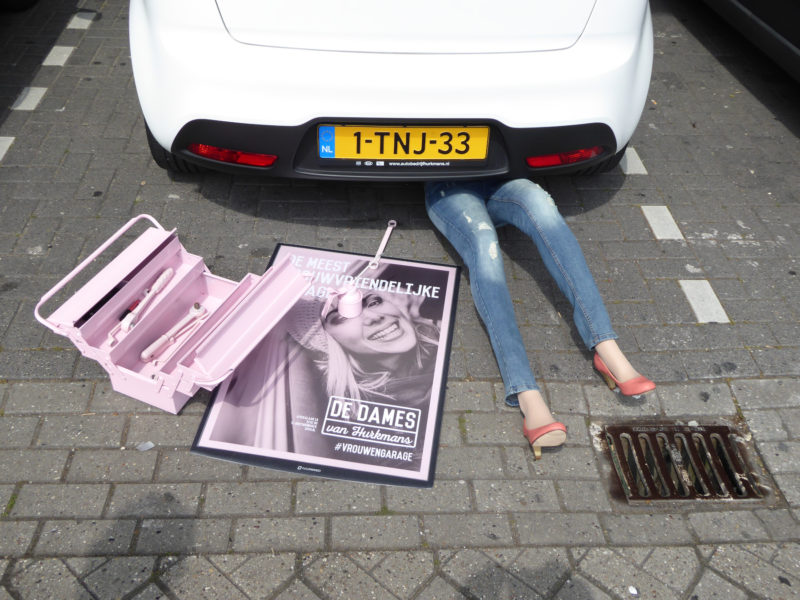
This is a guerrilla marketing campaign by “De Dames van Hurkmans“, the first women’s car repair shop in the Netherlands. It was opened in 2016 by sisters Janita and Mariëlle Hurkmans. They both grew up with cars; their parents already started a car dealership business together. That’s why they also chose a career in this field: Mariëlle Hurkmans in the technical area and Janita Hurkmans in sales.
In their workshop with attached car dealership, which is still the only one under female management in the Netherlands, it is mainly women who take care of repairs, administration and sales. A total of eleven people work here, seven of them women. However, there are also four men working in the workshop and in the team handling the processing of damage claims, as diversity is important to the founders. The first one already joined the team in the founding year 2016.
Female and male clientele
The Hurkmans sisters have more than 15 years of experience in the industry and know: The average car dealership is made by men for men. That is why the founders orientate their company towards female customers. “Sixty-eight per cent of our clientele are women. But we have also noticed that men like to come to us, “says Janita Hurkmans. “They are happy not to have to pretend to know about cars, although they have no idea at all.”
She has also heard from female customers in conversations that they feel safer at the women’s car dealership and are not afraid to ask questions. “With men, they are worried that they will be seen as stupid.” Advice from woman to woman is also different, Hurkmans explains. “With salesmen, it’s often the case that they immediately start with long monologues about the special features of the car. They try to sell you things that you didn’t want in the first place. We do things differently here. We let the customers talk and listen carefully to what they want.”
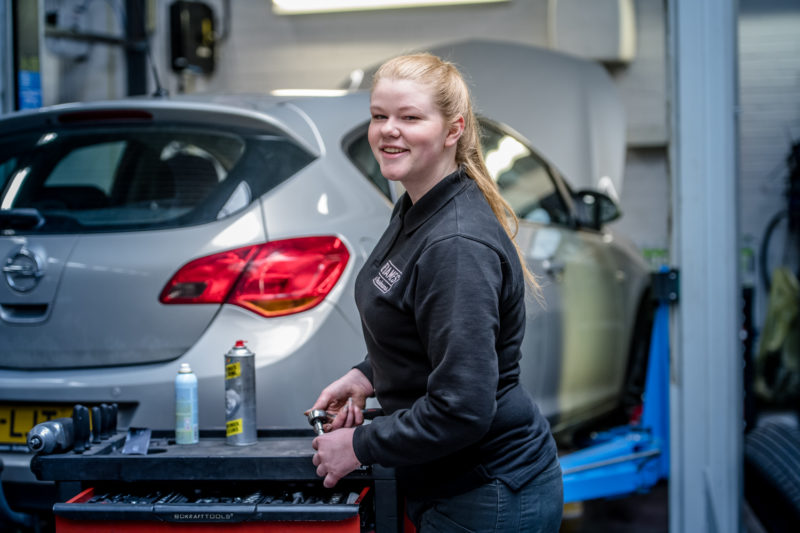
The Hurkman sisters also offer workshops such as “Breakdowns without men”. Here, the participants learn what it means when a check light comes on, how to change a tyre and check the oil level, or how to fill out the claim form for the insurance company in case of an accident.
The workshop and showroom are also designed with the target group in mind: Decorated with colourful cushions, there are women’s magazines on tables and even various nail polishes are available in case customers want to bridge the waiting time with a manicure. Of course, the ladies at Hurkmans know that they are playing with clichés here and that not every woman likes to wear nail polish.
That’s why Janita Hurkmans is also annoyed that as part of the huge media attention they are getting in the Netherlands, an article was also published that only focused on the detail of the nail polishes. “That’s just a mini part of our concept. I wondered whether the journalist could have written something else. We built up our car dealership from scratch, close big deals and have come so far. We didn’t do it just because of the nail polish, but because we know what we’re doing.”
Only three girls in the vocational school class
Lisa Versteeg also knows that stylish fingernails and car repairs are not mutually exclusive. The 22-year-old wears long, pointed acrylic nails and has been working as a car mechanic at “De Dames van Hurkmans “ for three years. Her father has a company for large agricultural machines and she actually thought that she would also go down this path. At vocational school, however, cars seemed more interesting to her.
Already there, the difference in genders became apparent. “There were three girls in my class. That was really a lot. Of course there were also some boys who asked: ‘What does she want here?’ Others thought it was good and were curious why we were doing it.”
Nevertheless, she also had to experience sexual harassment at the vocational school. “The boys seemed to want to show off a bit. I was putting on my overalls for work and bent forward with my upper body. That’s when a fellow student came very close to me from behind. It made me very uncomfortable”, she recalls. He certainly wouldn’t have done that to another boy, she believes.
15 per cent women in technical professions
Even though women outnumber men in “De Dames van Hurkmans”, the situation is clearly different across the country: According to surveys by the Dutch Statistics Office women made up a vanishingly small proportion in technical occupations in 2021 (third quarter). Converted, about eight out of ten employees are male. In concrete figures, this was 1,021 men and 181 women, which corresponds to about 15 per cent. In the assembly and repair sector in general, the numbers were even lower. In the fourth quarter of 2021 155 people worked in the category of metalworkers and machine assemblers, five of them female. In the field of electricians, 93 persons are listed, but only four of those are women.
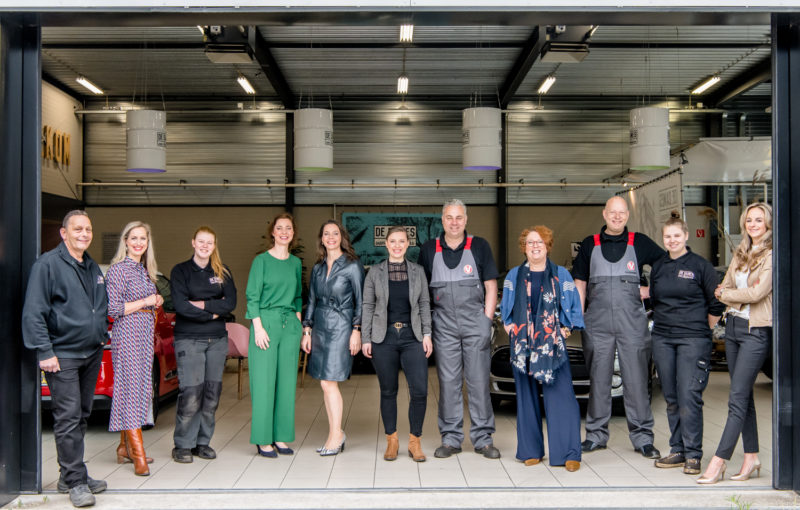
The industry organisation “Techniek Nederland” has even found that only three per cent of technical staff are female. Most of the women who work in this sector do so in the field of communication and administration. This is also confirmed by figures from the Employers’ Insurance Institute. According to their surveys, the number of female car mechanics in the country from 2010 to 2020 was a maximum of two per cent.
Janita Hurkmans has experienced how few women are also represented in car sales and what prejudices there are because of this. “I worked in sales for a long time in car dealerships. When I approached the customers, it was usually clear to me straight away: They now think I’m asking if they want coffee. In their eyes, I was always the coffee lady.” However, she used this to her advantage: “I simply started my sales talk and the mood quickly changed. Because as soon as the customers realised that I knew what I was talking about, the respect was almost greater than for my male colleagues.”
But she also knows that it is often difficult for young women in the automotive industry to get far at all. “They usually only sit in class with boys at technical school and then there are also teachers who don’t take them seriously,” she explains. Lisa Versteeg has had similar experiences. “What bothered me the most was that the entire class was linguistically geared towards the male form. Even in the class WhatsApp group, everything was always written with ‚he’. Even the teachers did it that way.”
The situation had not improved for internship contracts and employment contracts. There, too, only male formulations were used. It’s really no trouble to add a ‚they’, Versteeg says. “De Dames van Hurkmans” therefore pays attention to inclusive wording in the contracts.
25 per cent women by 2025
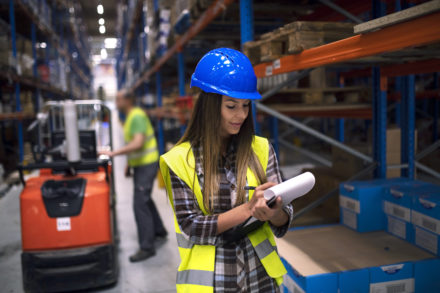
Marjorie Woudenberg knows that in order for more people and companies to see things this way in the future, a few adjustments need to be made. She comes from a family of technicians, which is why technology has always played a big role in her life. When she became aware of the lack of women in this industry, she started to think about how she could have a positive influence on it – and founded the platform “Techniekvrouwen“.
The list currently includes more than 1,000 women in technical professions, some of whom appear as ambassadors on the website to act as role models and inspirations for girls. They are featured in podcasts and online short profiles. But that alone is not enough, explains Woudenberg, as companies themselves also need to change and become more accessible to women. “We help tech companies with their employer image so they can recruit women more effectively”, she explains.
That is why it is important not to exclude women in the design of one’s own website – for example with photos that only show men. It must be shown that the corporate culture is open to diversity and inclusion. But concrete conditions of job advertisements are also important, says Woudenberg. “It’s about small things, but they have to be shown consistently. For example, working hours like part-time or full-time. Training and promotion opportunities, but also the atmosphere on site are important.”
With these small but decisive changes, Techniekvrouwen hopes to have achieved that 25 per cent of all employees in the tech sector are female by 2025. An ambitious goal, but not impossible. This is shown by “De Dames van Hurkmans”: There, almost 65 per cent are women.

